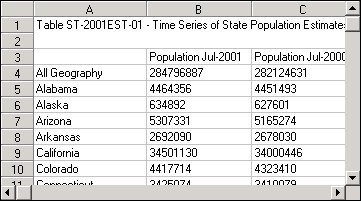AddCellSpan Method
Applies To
fpSpread control
Description
Adds a span of cells.
Syntax
BOOL CSpreadSheet::AddCellSpan(long lCol, long lRow, long lNumCols, long lNumRows);
fpSpread1.AddCellSpan(ByVal lCol As Long, ByVal lRow As Long, ByVal lNumCols As Long, ByVal lNumRows As Long) As Boolean
Parameters
The following parameters are available:
| Parameter | Description |
|---|---|
| lCol | Column number of cell at which to start the span |
| lRow | Row number of cell at which to start the span |
| lNumCols | Number of columns to span |
| lNumRows | Number of rows to span |
Remarks
Creating a span of cells creates one large cell where there had previously been several. For example, if you create a span of cells from cell A1 to cell C2, cell A1 then appears to occupy the space from cell A1 through cell C2, as shown in the following figure.

When you create a span of cells, the data in the first cell in the span (designated by the lCol and lRow parameters) occupies all the space in the span. When you create a span, the data that was in each of the cells in the span is still in each cell, but not displayed. The data is simply hidden by the span range. Also, the cell types of the cells combined in the span are not changed.
This method is called for the current sheet setting unless you first set the Sheet property to specify the sheet with which you want to work.
You can return whether a specified cell is in a span of cells by calling the GetCellSpan method. You can remove a span from a range of cells by calling the RemoveCellSpan method.
| Note: You cannot sort a sheet that has spanned cells. |
Spread Designer
Choose the Cell menu, and then the Span menu, and then make changes with the Column and Row combo boxes and Columns to Span and Rows to Span spin boxes in the Create Span dialog box.
Return Type
True if successful; otherwise, False.
See Also
Sheet property
GetCellSpan, RemoveCellSpan methods
DLL Correspondence
SSAddCellSpan function





